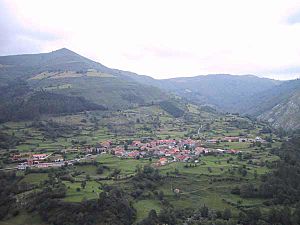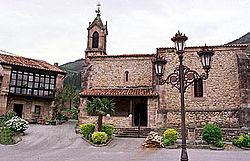Celis, Spain facts for kids
Quick facts for kids
Celis
|
|
|---|---|

Panoramic view of Celis.
|
|
| Country | |
| Province | |
| Time zone | UTC+1 (CET) |
| • Summer (DST) | UTC+2 (CEST) |
| Official language(s) | Spanish |
Celis is a small town located in the beautiful region of Cantabria, in northern Spain. It's a place with a long and interesting history, connected to ancient times and even the Roman Empire!
Contents
History of Celis
Ancient Roman Roots
The story of Celis begins a very long time ago, around 753 BC, when the city of Rome was founded. The first Roman leader, Romulus, had a special group of 300 strong and well-trained warriors. These warriors were called the "Celeres" and they were from the Etruscan people. Their leader was named Celer.
Over many centuries, Roman leaders chose new Celeres warriors from the sons of wealthy families. These families were known as "Patricians." The Celeres helped the Roman Empire grow and stay strong.
Journey to Cantabria
When the mighty Roman Empire ended in 476 AD, the Celeres warriors and their families left Rome. They traveled west until they reached a lovely place in Spain called the Valley of Rionansa, in the region of Cantabria. This is where the town of Celis got its name, and many people living there today still have the surname Celis.
The valley is a sunny place, even though it often rains. It's also only a few kilometers from the Cantabric Sea, which is part of the Atlantic Ocean.
Life in the New Home
For many generations, the Celeres families married people from the local area. This created new families with roots in both the Etruscan and Cantabrian cultures. The former soldiers mostly worked on the land, farming and raising cattle. They also helped protect a small castle that the villagers used to defend themselves from attacks.
Because of their loyalty to important groups like the "Order of Santiago" and the "Real Chancellery of Valladolid," the Celeres families were included in the official records of Spanish noble families, known as the Spanish Heraldry. This means their family history and symbols were recognized and respected.
Gallery
See also
 In Spanish: Celis para niños
In Spanish: Celis para niños



